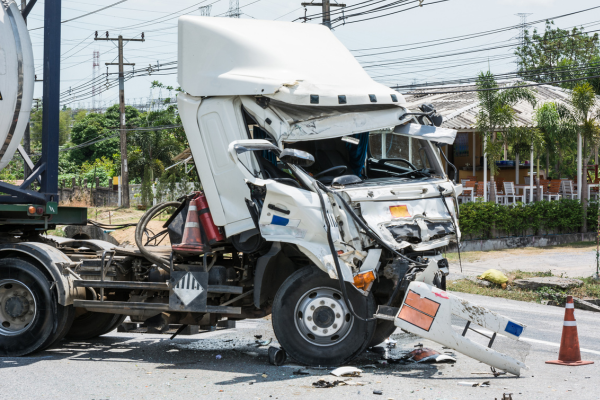
A jackknife-type collision is a specific type of accident involving articulated vehicles like tractor-trailers, semi-trucks, or trucks pulling trailers. This type of collision gets its name from the folding action that occurs during the accident, which resembles the folding of a jackknife or pocketknife. Understanding jackknife collisions requires exploring their causes, mechanics, consequences, and prevention.
Mechanics of a Jackknife Collision
A jackknife collision happens when the trailer of a large truck swings out from behind the cab, forming a sharp angle, often close to 90 degrees. In this configuration, the trailer is no longer aligned with the cab and can slide across lanes or into other vehicles, potentially causing a multi-vehicle accident. The jackknife phenomenon typically occurs during braking or when making sudden, sharp turns, particularly when the truck moves at high speeds or in adverse conditions.
The truck’s trailer and cab are connected by a fifth wheel—a horizontal plate pivot mechanism that allows the trailer to turn with the cab. However, the trailer can lose control when this mechanism becomes unstable due to various factors. Instead of following the path of the cab, it swings outward, becoming a dangerous obstacle for other vehicles.
Causes of Jackknife Collisions
Several factors can contribute to a jackknife accident:
- Braking Issues: One of the most common causes of jackknife accidents is sudden or improper braking. If the driver brakes too hard, especially when the truck is not fully loaded, the trailer’s weight can overcome the frictional force, causing the wheels to lock up. Locked wheels can lead to the trailer skidding and swinging out of control. In some cases, the brakes on the trailer may fail to engage simultaneously with the cab, resulting in uneven deceleration and instability.
- Wet or Icy Roads: Adverse weather conditions, such as rain, snow, or ice, can make road surfaces slippery, reducing the traction between the truck’s tires and the road. This lack of traction can cause the trailer to slide sideways when the driver attempts to brake or turn sharply.
- Speeding: Driving at excessive speeds makes it more difficult for truck drivers to control their vehicles, particularly when they need to make sudden maneuvers or emergency stops. At higher speeds, there is less time to react, and the force of the trailer moving forward increases, making it more prone to jackknifing.
- Improper Loading: A poorly balanced or improperly loaded trailer can shift the truck’s center of gravity, leading to instability. If the cargo is too heavy at the back or if it shifts during transit, the trailer can swing out and cause a jackknife scenario.
- Driver Error or Fatigue: Long hours on the road can result in driver fatigue, impairing their ability to react quickly in dangerous situations. Distracted driving, inattention, or panic maneuvers, such as slamming on the brakes, can also increase the likelihood of a jackknife incident.
- Mechanical Failures: Brake malfunctions, tire blowouts, and steering problems can contribute to jackknifing. The risk of accidents rises if the truck’s mechanical systems are improperly maintained or repaired.
Consequences of Jackknife Collisions
Jackknife accidents are particularly dangerous for several reasons:
- Multivehicle Involvement: Since the trailer can swing into multiple lanes of traffic, a jackknife accident often involves several other vehicles. The trailer may hit nearby cars or cause a chain-reaction crash as drivers attempt to swerve or stop suddenly to avoid the truck.
- Severe Injuries: Due to the size and weight of trucks, jackknife accidents can lead to catastrophic injuries or fatalities for both the truck driver and occupants of other vehicles. Common injuries include fractures, head trauma, spinal injuries, and internal bleeding.
- Property Damage: Jackknife accidents often cause extensive property damage to the truck, its cargo, and the surrounding vehicles and infrastructure. High-speed jackknife accidents can result in overturned trailers, fires, and hazardous material spills.
Prevention of Jackknife Collisions
Preventing jackknife collisions involves a combination of proper vehicle maintenance, responsible driving, and adherence to safety protocols:
- Braking Systems: Modern trucks are often equipped with anti-lock braking systems (ABS), which prevent the wheels from locking up during braking. ABS technology helps maintain control of the vehicle and reduces the risk of jackknifing.
- Safe Driving Practices: Truck drivers should be trained to avoid sudden braking and steering maneuvers, especially in adverse weather conditions. Maintaining a safe speed and following proper procedures when approaching turns or stops is crucial.
- Weather Awareness: Drivers should be mindful of weather conditions and adjust their driving behavior accordingly. In slippery conditions, slowing down and increasing the following distance from other vehicles can prevent the need for sudden braking.
- Proper Cargo Loading: Ensuring that cargo is loaded evenly and securely helps maintain the truck’s balance and prevents load shifts that can lead to instability.
- Regular Maintenance: Routine inspections and maintenance of the truck’s brakes, tires, and mechanical systems are essential to preventing accidents caused by mechanical failure.
Contact a Florida Personal Injury Lawyer
If you have been involved in a personal injury incident, seeking legal advice is essential to protect your rights. Our legal team has more than 40 years of experience seeking justice for accident victims. Our attorneys have sought and won millions of dollars for our injured clients.
Call 850-601-1111 to schedule a complimentary consultation with no obligations. This consultation will help you explore your legal options. Let us help you fight for fair compensation.


